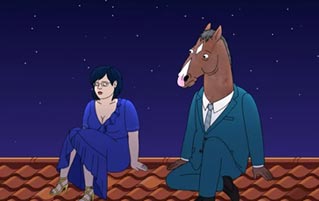Why Fan Theories Are Forcing A Bad Ending On BoJack Horseman

The sad horse show has ended, and it will likely go down as one of the greatest ever made. As a testament to its popularity, the internet was flooded with fan theories about what really happened in the finale, which confused some viewers by clearly spelling things out. And while we love a good fan theory as much as anyone, hence our masterful 4,500 word argument that BoJack is secretly set on an Earth that's actually slightly different from our own, we're a little worried about the apparent lesson some people are taking away from it.
As a quick refresher/massive spoiler, the third-last episode (or antepenultimate episode, if you're nasty) sees BoJack relapse and collapse into his pool. The second to last episode is a dream where the drowning BoJack grapples with his mortality, tackles philosophical issues with dead characters, and does other fun cartoon stuff. Then, in the finale, he's hauled out of the pool at the last moment, revived, and finally forced to face true legal and personal consequences. But what YouTubers and other fans rushed to posit was "What if he did die, and the finale was all still his final dream?!?!?!"
If you're the sort of person who looks at a show's clever background details and sees a web of conspiratorial hints to map out with string, then you can ostensibly create evidence for that idea. Sure, BoJack explicitly says otherwise by showing him flatline and then recover, but no good "He was secretly dead/in purgatory/a zombie robot trapped in a time loop" theory lets the facts slow them down. Again, silly theories can be fun. But in BoJack's case, picking apart the evidence is irrelevant, because the message of "That fucked-up horse is dead" is such an insane takeaway that we have to wonder if proponents were secretly watching a different show.

If there was one overarching theme throughout six seasons of BoJack, it's that you have to keep trying to be better. You can't wallow in the false assumption that you're the only person with problems, you can't acknowledge bad habits but then keep asking to be forgiven for them instead of trying to address them. You can struggle with addiction and mental illness, but you can't use them an excuse for abusing personal relationships. It's okay to relapse, but there's nothing heroic about letting your trauma define all that you are. Maybe life doesn't have any inherent meaning, but that's not an excuse to hurt people who want to enjoy theirs anyway.
All of this is pretty much said directly to the audience at various points in the series, so to theorise that the show was secretly saying "Oh, we were just kidding, some people are inherently broken and doomed to fail and die, and aren't you smart for picking up on it" is, shall we say... misguided. Hell, hordes of fans were predicting BoJack's death for years because any ending other than total oblivion would be a "Hollywood" cop-out that wasn't "satisfying." Just happily watching season after season while ignoring what it was trying to say, waiting for a nihilistic ending (and arguing that it should have had one after the fact) so they could declare themselves smart for "getting it."

There's a school of creation and fandom that says "Art is only true art if it's super depressing," whether it's certain high-brow literature, schlock like The Walking Dead, or the Academy Award-winning Joker. Maybe it's leftover teenage angst, maybe it comes from skimming Nietzsche's Wikipedia page and not quite grasping the point. Regardless, a lot of people apparently wanted BoJack to be empty misery porn, if all the "BOJACK'S TOP TEN MOST SOUL CRUSHING MOMENTS!!" videos and performative "I watched BoJack and now I'm so depressed I'm going to get hammered!" social media posts were anything to go by. No, BoJack's not exactly Pollyanna, but if you have the kind of perspective on it that the goddamn LEGO Movie made fun of, maybe it's not really all that clever of a way to look at life.
The "BoJack died because reality is dark and tragic" theory also has to ignore another theme that bubbled along throughout the series: people telling BoJack they can no longer have him in their lives because of how toxic his presence can be. It's all but flat-out shouted in the finale, where Princess Carolyn tells BoJack she won't work with him again, and Diane tells him she'll never see him again. They have their own lives to live, and BoJack just has to go on with his.
For all of that to have happened only in BoJack's dying neurons implies that drinking yourself to death will help solve other people's problems. But there's nothing interesting or redeeming about hating yourself until it kills you. It's the height of narcissism to think that you can atone for damage you caused by making yourself suffer for it, then declaring that the self-inflicted suffering made you a tragic hero. Sometimes you just have to let the people you hurt move on and thrive without you. Killing yourself for them instead of letting them assert their distance will just hurt them all over again.
So to look at a show that says "Keep going, do better" and respond with "But isn't it more mature to just give up because change is hard and we're all going to die one day anyway?" implies that the universe only exists to cater to you, that everyone else working hard to overcome their problems is just set dressing to your own misery, and that it's braver to die than improve. And, well, there's nothing especially mature about that at all.
Mark is on Twitter and wrote a book.